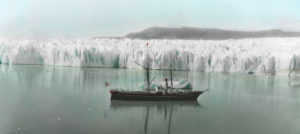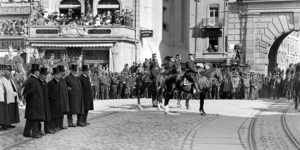
Switzerland as a safe haven for pacifists
During the First World War, many pacifists fled to Switzerland. From there, they endeavoured to initiate peace talks. Foreign propagandists sought to exploit the pacifist environments in Switzerland to weaken their opponents.
During the First World War, Switzerland was an international place of refuge for many who opposed the war. But the presence of émigrés from all backgrounds, and the country’s location in the midst of warring states, made Switzerland not only a centre of mediation in Europe, but also the focus of numerous intrigues.
Bern, Zurich and the shores of Lake Geneva were preferred locations for the pacifist dissidents to set up their new homes. The settlement of Monte Verità in Ticino also developed into a pacifist centre, where figures such as German writer Hermann Hesse became staunch opponents of the war.
The pacifist ideology
Among the émigré pacifists from the Central Powers, two groups with differing ideological views can be identified. The first group, with liberal-democrat views, was centred around Die Friedens-Warte Journal of International Peace and Organization, published in Switzerland from March 1915 by Austrian Nobel laureate Alfred H. Fried. First and foremost, this group sought a democratic reform of domestic and foreign policy, and a negotiated peace between the Central Powers and the Entente on that basis. The second émigré group formed in 1917 around Die Freie Zeitung, a newspaper published in Bern. Among its supporters, the war had led to the conviction that German militarism could only be overcome by defeating the Central Powers. In that respect, it was only logical to see a victory for the Entente as a fundamental reformation of the German empire. In addition to several Swiss editors, its members included the journalist Hermann Rösemeier, writer Eduard Stilgebauer, Richard Grelling, the co-founder of Dadaism Hugo Ball and the philosopher Ernst Bloch.
As well as those from the Central Powers, numerous pacifists from the countries of the Entente also sought refuge in Switzerland. After the French writer Romain Rolland decided, when war broke out, to remain in Switzerland, further expatriates also took up residence in the area of his home at Lake Geneva. These included the writer Henri Guilbeaux, Belgian painter Frans Masereel, psychoanalyst Charles Baudouin and typographer Claude le Maguet. In western Switzerland, they sought to establish a pacifist counterculture to the escalating warmongering, publishing a number of journals and periodicals for that purpose.
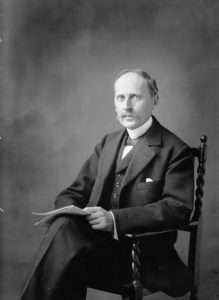
Romain Rolland (1866-1944) was a key figure in the opposition to the war in Europe. Bibliothèque de Genève
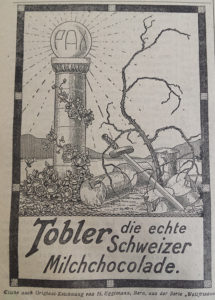
The inventor of Toblerone, ‘chocolate baron’ Theodor Tobler, was known for his pacifist beliefs and had adverts for his ‘real Swiss milk chocolate’ printed in Die Freie Zeitung. Die Freie Zeitung
Zurich as the birthplace of Dadaism
During the war, the city on the River Limmat became a global metropolis, with cafés and stylish bars teeming with intellectuals from all over the world. In February 1916, German expatriates Hugo Ball and Emmy Hennings founded the Cabaret Voltaire, considered the birthplace of Dadaism. This artistic movement was an ‘anti-war fool’s game’ which expressed a radical rejection of war. Essentially, the Dadaists produced anti-art; by professing to celebrate nonsense, their art was the most radical counter-programme imaginable to the empty pathos of the patriotic war hymns that were rife throughout Europe. The poem Totentanz 1916 by Hugo Ball became very well known:
So we die, we die
And die every day,
For it is so comfortable to let ourselves slip away.
The morning, stuck in sleep and dream,
By midday already there,
Come evening deep within our graves.
The battle is our pleasure-house,
Our sun is made of blood,
Death our emblem and our password.
[…]
So we kill, we kill,
And every day we kill
Our comrades in the dance of death.
[…]
We thank you, we thank you,
Herr Kaiser for your mercy,
In choosing us to die
[…] (Translation by Edmund Potts)
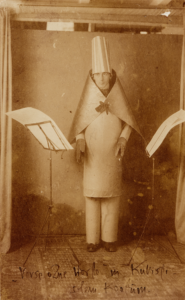
Hugo Ball dressed as a bishop in a 1916 performance at Cabaret Voltaire. Schweizerisches Literaturarchiv (Swiss Literary Archive)
In the firing line of propaganda
While Switzerland remained outside the military conflicts during the First World War, it by no means escaped the bombardment of propaganda by the belligerents. When the warring countries were confronted, from 1916 onwards, by increasingly war-weary populations of their own, the propaganda machine started to focus more sharply on the pacifist expatriates in Switzerland. Since the pacifists and their ideology could potentially motivate the populations of their countries of origin to move away from the policy of war pursued so far, the belligerents sought to influence the public opinion of their military opponents, and in this way to weaken them. The group of German expatriates associated with Die Freie Zeitung therefore received financial support from France and the USA. And by the same token, the French-language pacifist journals benefited from financial support from Germany. The concrete benefit for Germany became apparent when the journal demain, published by Guilbeaux, reported on the mutinies that broke out among French soldiers after the failure of the Nivelle Offensive. Almost all the newspapers in France had remained silent on that issue. The presence of pacifist émigrés and the propaganda activities also caused problems for the Swiss authorities, who were at pains to maintain neutrality. For instance, the French government accused Guilbeaux, who lived in Geneva, of having instigated revolutionary movements in France. Despite a number of attempts by Romain Rolland to defend him, Guilbeaux was finally arrested in Switzerland in May 1918, although he was freed in August due to a lack of evidence.
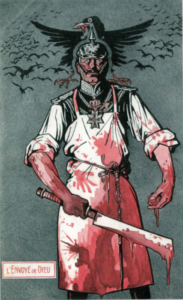
The depiction of German emperor Wilhelm II as a ‘bloodthirsty butcher’ aimed to bring about a repudiation of the German belligerence which he personified. Historisches Archiv und Bibliothek PTT (PTT Historical Archive)


